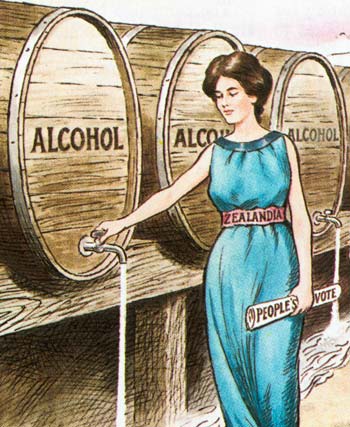Story summary
Early liquor laws
New Zealand has had laws around the selling and buying of alcohol since it became a British colony in 1840. Between 1852 and 1876 each province had different liquor laws. When the Licensing Act 1881 was passed it made the law consistent across the whole country. The law made it harder to open new bars and bottle shops, restricted opening hours and imposed a ‘drinking age’.
The temperance movement
The temperance movement became more influential from the late 1800s. Supporters believed that alcohol caused social problems, including poverty and ill health, and wanted to prohibit (ban) alcohol. This movement’s growing influence led to law changes and between 1894 and 1908, 12 out of 76 general electorates voted to ban to liquor sales in their area. The drinking age was raised to 21 in 1910. During the First World War the closing of bars at 6 p.m. was introduced.
Referendums on prohibition
Between 1911 and 1987 there were 24 national referendums on whether alcohol should be banned in New Zealand. They were usually held at the same time as the general election. There were almost enough votes to ban alcohol in 1919, 1922 and 1925, but after that the ‘prohibition’ vote fell. In 1987 the referendums stopped.
Reforming liquor laws
Until 1948 there were different liquor laws for Māori, which restricted their access to alcohol. Between 1893 and 1952 most women couldn’t hold liquor licences.
Liquor laws changed in the 1960s and 1970s, reflecting a changing society. Parliament allowed restaurants to sell alcohol and bars to stay open after 6 o’clock in the evening.
Sale of Liquor Act 1989
Following the recommendations of the Working Party on Liquor, the government passed a new act which reformed liquor laws. It became easier for a bar or restaurant to get a liquor licence, but also easier for them to lose it if they broke the rules. Supermarkets were now allowed to sell wine.
Further reforms
In 1999 the drinking age was lowered to 18 and supermarkets were allowed to sell beer as well as wine. However, concerns about alcohol abuse, especially by young people, led many to call for the drinking age to be raised again, and for laws around alcohol to be tightened.





